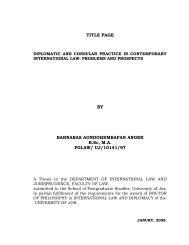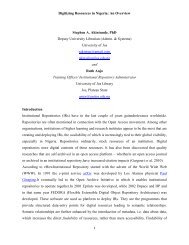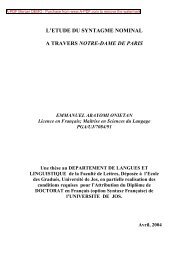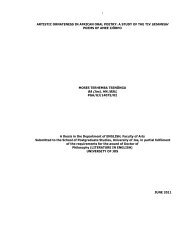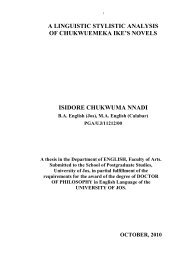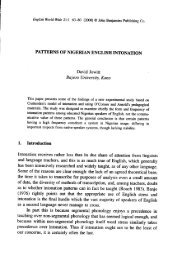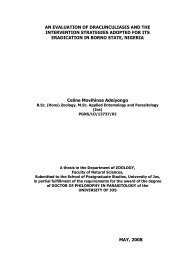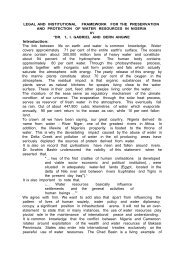Professor Atiene Solomon Sagay - University of Jos Institutional ...
Professor Atiene Solomon Sagay - University of Jos Institutional ...
Professor Atiene Solomon Sagay - University of Jos Institutional ...
Create successful ePaper yourself
Turn your PDF publications into a flip-book with our unique Google optimized e-Paper software.
couples, no abnormalities are found (unexplained infertility). It is estimated that one out <strong>of</strong><br />
every 6 couples in Nigeria are infertile.<br />
We evaluated 1000 consecutive infertile women in <strong>Jos</strong>, Nigeria and found that 410 (41%) had<br />
never ever conceived (primary infertility) while 590 (59%) have had at least one prior<br />
pregnancy (secondary infertility) (<strong>Sagay</strong> et al 1998). More than 4 out <strong>of</strong> every 10 (42.3%) <strong>of</strong><br />
these women had blocked tubes on both sides (bilateral tubal occlusion). Of the 548 (54.8%)<br />
<strong>of</strong> these infertile women who were found to have pelvic adhesive disease, two-thirds (66%)<br />
had moderate to severe pelvic adhesions for which reconstructive surgical outcome is poor.<br />
What this means is that a large proportion (about 40%) <strong>of</strong> infertile women in Nigeria have<br />
badly damaged reproductive organs for which assisted conception in the form <strong>of</strong> in-vitro<br />
fertilization and embryo transfer (a.k.a. test tube baby) is required. The prevailing cost <strong>of</strong> this<br />
procedure in Nigeria (about 700,000 Naira) is however out <strong>of</strong> the reach <strong>of</strong> most infertile<br />
couples in this country.<br />
On the male side, we studied the semen quality <strong>of</strong> male partners <strong>of</strong> infertile couples in <strong>Jos</strong><br />
(Imade et al. 2000). In all, we analysed the semen <strong>of</strong> 428 male partners <strong>of</strong> infertile women<br />
using the World Health Organisation (WHO) guidelines. The findings revealed that 124<br />
(29%) <strong>of</strong> the men had normal semen parameters (normozoospermia) while 304 (71%) had<br />
abnormal semen quality. The semen abnormalities comprised; 39 (9.1%) with complete<br />
absence <strong>of</strong> spermatozoa (azoospermia), 89 (21%) with significantly reduced population <strong>of</strong><br />
spermatozoa (oligozoospermia), 22 (5.1%) with poor movement (asthenozoospemia) and 18<br />
(4.2%) with abnormal physical forms (teratozoospermia). Another 134 (31.5%) men had<br />
various combinations <strong>of</strong> these seminal abnormalities. The findings suggested that the male<br />
partner is a significant contributor to the problem <strong>of</strong> infertility in <strong>Jos</strong>.<br />
Psycho-social consequences <strong>of</strong> infertility<br />
A Yoruba adage says “Omo laso”, meaning children are clothes, without them you are<br />
naked. Infertile couples feel insecure and vulnerable to societal stigmatization.<br />
The psycho-social challenge faced by infertile women is age-long. Evidence from<br />
biblical time shows that women have contemplated suicide as a response to their<br />
continued barrenness. Rachael, wife <strong>of</strong> Jacob considered live worthless without a<br />
child <strong>of</strong> her own: [Gen 30:1 And when Rachel saw that she bore Jacob no children,<br />
Rachel envied her sister. And she said to Jacob, Give me sons, or else I will die].<br />
Anthropologists who worked in different communities in the South-south region <strong>of</strong> Nigeria<br />
concluded that; "the necessity for a woman to have a child remains basic in this region.<br />
Motherhood continues to define an individual woman's treatment in her community, her selfrespect,<br />
and her understanding <strong>of</strong> womanhood" (Hollos et al 2009).<br />
In focus group discussions on the social meaning <strong>of</strong> infertility in south-western Nigeria,<br />
(Okon<strong>of</strong>ua et al.1997) reported the following community perceptions;<br />
that infertility is not <strong>of</strong>ten discussed, and if at all, must be discussed carefully and<br />
privately. This was largely to avoid embarrassing those who were infertile.<br />
that an infertile person would be extremely sensitive to any discussion about children<br />
or pregnancy, and would assume that even comments in casual conversations were<br />
2



